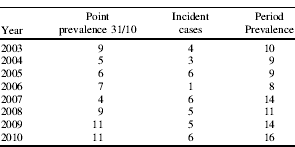The four centres with the facilities and expertise to give prolonged PN beyond term and provide paediatric (<16 years of age) HPN are formalised within the Scottish HPN MCN. Scotland comprises 8.6% of the UK paediatric population. We aimed to demonstrate incidence and prevalence of the need for paediatric HPN in Scotland, as a representative part of the UK.
The prospective cohort of paediatric HPN cases in Scotland has been ongoing from 01/2003. We reviewed prevalence and incidence for each year from 2003 to 2010, (including point prevalence on each 31st of October). Outcomes included fate – namely continuing HPN, leaving paediatric network, and reason why. Population data for Scotland from the General Register Office (http://www.groscotland.gov.uk) provided population numbers (and estimates where needed) for Scots aged <16 years, results were standardised to the 2001 census, and trend analysis performed for the 2 epochs 2003–06 and 2007–10.
There were 40 HPN cases (42 episodes), with 6 prevalent cases on 01.01.03, 34 incident HPN cases (36 HPN episodes), and 30 cases stopped HPN – see table for incidence and prevalence. 20 patients (22 episodes HPN) had short bowel syndrome, 10: neuromyopathic gut disease, 8: mucosal gut disease, 2: other. Outcomes; 14 adapted, 1 transitioned, 1 left Scotland, and 10 died. 8 year survival was 75%. Standardised (95% CI) period prevalence rates rose from 1.06 (0.51–1.95) in 2003 to 1.76 (1.01–2.86) in 2010, with a significant increase from 2003–2006 to 2007–2010 (P=0.003). Rises in standardised point prevalence and incidence were not significant.

We report nationwide incidence and prevalence of paediatric HPN in Scotland, from the 4 centres. Extrapolation to the UK suggests that there are annual minimum paediatric incidences and period prevalence of 48 and 126 cases. Standardised 2010 point prevalence and incidence rates of 12.1 and 5.5 per million compare with and validate the 13.7 and 6.0 per million respectively from a recent UK survey (Reference Beath, Gowen and Puntis1); however our period prevalence data suggests a higher rate of 15.4 per million.


